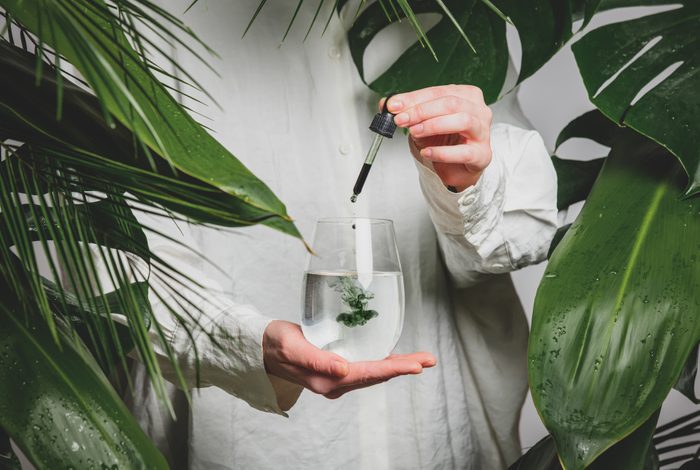Should You be Drinking Chlorophyll Water?

Liquid chlorophyll is trending for being a cure-all, but there’s not a lot of evidence to back up the health claims.
You probably last heard the word chlorophyll in middle school science class. But the green pigment found in plants, which helps them turn sunlight into nutrients, is now a health and wellness trend. Chlorophyll water is the latest popular cure-all with a lengthy list of celebrity endorsements and supposed health benefits. Stars like Kourtney Kardashian and Mandy Moore have touted its benefits, which they claim include improving digestion, maintaining hormonal balance, deodorizing, detoxing and strengthening the immune system.
But does it really work? And if it does, can adding chlorophyll to your daily water intake have that many health benefits? Here’s what you need to know.
(Related: 15 Supplements Nutritionists Don’t Take—So You Shouldn’t Either)
What is chlorophyll water?
While naturally occuring chlorophyll is responsible for a plant’s green hue, it isn’t water-soluble — so it’s not readily absorbed by our body. Instead, chlorophyll water and supplements use a semi-synthetic copper compound obtained from chlorophyll called chlorophyllin. “In other words, chlorophyll is a natural compound found in plants, while chlorophyllin is a supplement,” says Julie Mancuso, owner of JM Nutrition, a Toronto-based nutritional counselling service. Most of the chlorophyll water options on the market come as liquid in a bottle that users are supposed to add to a glass of water.
Aside from plants and supplements, chlorophyll is found in all sorts of foods, mainly leafy green vegetables. Spinach, parsley, alfalfa, broccoli, green beans, arugula, and algae like spirulina are just some examples.
(Related: 11 Fruits and Veggies to Buy Frozen)
What are the health benefits of chlorophyll water?
There are a ton of supposed health benefits of consuming chlorophyll, including weight loss, detoxification, cancer prevention, blood building, wound healing and treating acne. Proponents also claim that chlorophyll can help neutralize your body odour from the inside out, like an internal deodorant.
It’s important to note, however, that there isn’t a lot of research to back up the health claims associated with chlorophyll and chlorophyllin. “There haven’t been many human trials, much of the research is cellular and/or has been conducted on animals,” says Mancuso. “Although social media is abuzz with the purported benefits of chlorophyll, and many celebrities and influencers are great proponents, the evidence is generally anecdotal.”
(Related: What You Need to Know Before Taking Biotin Supplements)
Are there any risks associated with chlorophyll water?
Since the research is so early and limited, it’s hard to assess the risks. “As with anything, risks and adverse side effects are always possible,” says Mancuso. “Simply put, we would know more only after conducting extensive evidence, which is currently lacking.”
Well, should you try drinking chlorophyll water?
Some early studies show promise, says Mancuso, but the operative word is early. “Certainly, more research is needed to substantiate any of these bold claims.”
I tried it for myself and downed a nice, tall glass of chlorophyll water a couple times a day for a week. I drank Nature’s Sunshine’s product, which suggested I add about two teaspoons of the green liquid to a glass of water, give it a stir and drink four times daily. While the green drink tasted way better than I thought it would (it reminded me of cooled-down spearmint tea and not like the swamp water it resembled), I didn’t experience any of the supposed health benefits the product claims to deliver. Anecdotally, I don’t think my experiments in drinking chlorophyll really did much other than make me have to use the washroom more often… but I think that has more to do with drinking more water throughout the day. I’ll likely forgo drinking chlorophyll water and just continue adding spirulina to my smoothies and eating lots of leafy greens.
Next, this is how you can add more beans and plant-based protein to your diet.




